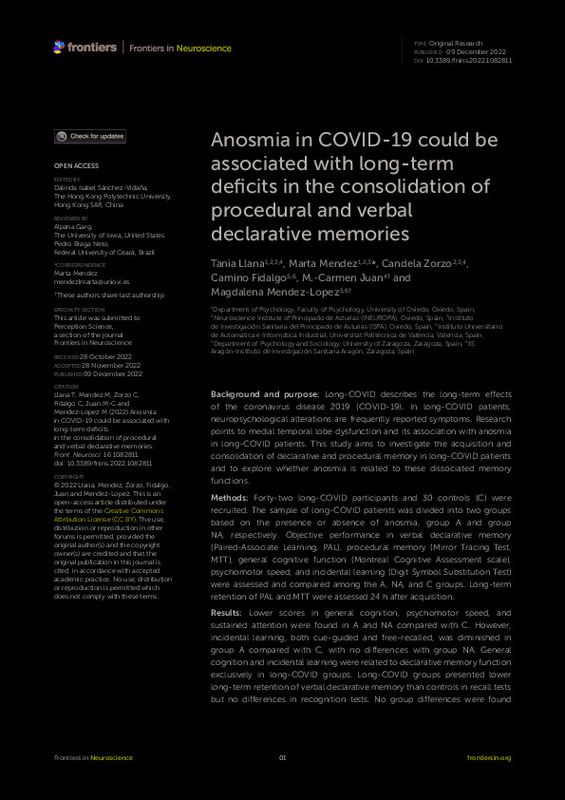JavaScript is disabled for your browser. Some features of this site may not work without it.
Buscar en RiuNet
Listar
Mi cuenta
Estadísticas
Ayuda RiuNet
Admin. UPV
Anosmia in COVID-19 could be associated with long-term deficits in the consolidation of procedural and verbal declarative memories
Mostrar el registro sencillo del ítem
Ficheros en el ítem
| dc.contributor.author | Llana, Tania
|
es_ES |
| dc.contributor.author | Mendez, Marta
|
es_ES |
| dc.contributor.author | Zorzo, Candela
|
es_ES |
| dc.contributor.author | Fidalgo, Camino
|
es_ES |
| dc.contributor.author | Juan, M.-Carmen
|
es_ES |
| dc.contributor.author | Mendez-Lopez, Magdalena
|
es_ES |
| dc.date.accessioned | 2023-10-26T18:01:39Z | |
| dc.date.available | 2023-10-26T18:01:39Z | |
| dc.date.issued | 2022-12-09 | es_ES |
| dc.identifier.uri | http://hdl.handle.net/10251/198865 | |
| dc.description.abstract | [EN] Background and purposeLong-COVID describes the long-term effects of the coronavirus disease 2019 (COVID-19). In long-COVID patients, neuropsychological alterations are frequently reported symptoms. Research points to medial temporal lobe dysfunction and its association with anosmia in long-COVID patients. This study aims to investigate the acquisition and consolidation of declarative and procedural memory in long-COVID patients and to explore whether anosmia is related to these dissociated memory functions. MethodsForty-two long-COVID participants and 30 controls (C) were recruited. The sample of long-COVID patients was divided into two groups based on the presence or absence of anosmia, group A and group NA, respectively. Objective performance in verbal declarative memory (Paired-Associate Learning, PAL), procedural memory (Mirror Tracing Test, MTT), general cognitive function (Montreal Cognitive Assessment scale), psychomotor speed, and incidental learning (Digit Symbol Substitution Test) were assessed and compared among the A, NA, and C groups. Long-term retention of PAL and MTT were assessed 24 h after acquisition. ResultsLower scores in general cognition, psychomotor speed, and sustained attention were found in A and NA compared with C. However, incidental learning, both cue-guided and free-recalled, was diminished in group A compared with C, with no differences with group NA. General cognition and incidental learning were related to declarative memory function exclusively in long-COVID groups. Long-COVID groups presented lower long-term retention of verbal declarative memory than controls in recall tests but no differences in recognition tests. No group differences were found in the acquisition of procedural memory. However, long-term retention of this memory was worse in group A as compared to the NA and C groups, respectively, when errors and time of execution were considered. ConclusionFindings support that consolidation of both procedural and declarative memories is more affected than the acquisition of these memories in long-COVID patients, who are also more vulnerable to deficits in delayed recall than in recognition of declarative memories. Deficits in the consolidation of procedural memory and immediate recall of declarative information are especially relevant in long-COVID participants with anosmia. This indicates that anosmia in COVID-19 could be associated with a long-term dysfunction of the limbic system. | es_ES |
| dc.description.sponsorship | This work was supported by the Conselleria d'Innovacio, Universitats, Ciencia i Societat Digital de la Generalitat Valenciana (GVA-COVID19/2021/025), Gobierno de Aragon (Departamento de Ciencia, Universidad y Sociedad del Conocimiento), and FEDER "Construyendo Europa desde Aragon" for the research group with reference S31_20D. | es_ES |
| dc.language | Inglés | es_ES |
| dc.publisher | Frontiers Media SA | es_ES |
| dc.relation.ispartof | Frontiers in Neuroscience (Online) | es_ES |
| dc.rights | Reconocimiento (by) | es_ES |
| dc.subject | Long-COVID | es_ES |
| dc.subject | Declarative memory | es_ES |
| dc.subject | Implicit memory | es_ES |
| dc.subject | Incidental learning | es_ES |
| dc.subject | Anosmia | es_ES |
| dc.subject.classification | LENGUAJES Y SISTEMAS INFORMATICOS | es_ES |
| dc.title | Anosmia in COVID-19 could be associated with long-term deficits in the consolidation of procedural and verbal declarative memories | es_ES |
| dc.type | Artículo | es_ES |
| dc.identifier.doi | 10.3389/fnins.2022.1082811 | es_ES |
| dc.relation.projectID | info:eu-repo/grantAgreement/GV INNOV.UNI.CIENCIA//GVA-COVID19%2F2021%2F025//Realitat virtual i augmentada i la seua aplicabilitat a la memòria espacial de pacients amb covid persistent/ | es_ES |
| dc.relation.projectID | info:eu-repo/grantAgreement/Gobierno de Aragón//S31_20D/ | es_ES |
| dc.rights.accessRights | Abierto | es_ES |
| dc.contributor.affiliation | Universitat Politècnica de València. Instituto Universitario de Automática e Informática Industrial - Institut Universitari d'Automàtica i Informàtica Industrial | es_ES |
| dc.contributor.affiliation | Universitat Politècnica de València. Escuela Técnica Superior de Ingenieros Industriales - Escola Tècnica Superior d'Enginyers Industrials | es_ES |
| dc.description.bibliographicCitation | Llana, T.; Mendez, M.; Zorzo, C.; Fidalgo, C.; Juan, M.; Mendez-Lopez, M. (2022). Anosmia in COVID-19 could be associated with long-term deficits in the consolidation of procedural and verbal declarative memories. Frontiers in Neuroscience (Online). 16:1-15. https://doi.org/10.3389/fnins.2022.1082811 | es_ES |
| dc.description.accrualMethod | S | es_ES |
| dc.relation.publisherversion | https://doi.org/10.3389/fnins.2022.1082811 | es_ES |
| dc.description.upvformatpinicio | 1 | es_ES |
| dc.description.upvformatpfin | 15 | es_ES |
| dc.type.version | info:eu-repo/semantics/publishedVersion | es_ES |
| dc.description.volume | 16 | es_ES |
| dc.identifier.eissn | 1662-453X | es_ES |
| dc.identifier.pmid | 36570827 | es_ES |
| dc.identifier.pmcid | PMC9780694 | es_ES |
| dc.relation.pasarela | S\482884 | es_ES |
| dc.contributor.funder | Gobierno de Aragón | es_ES |
| dc.contributor.funder | GENERALITAT VALENCIANA | es_ES |
| dc.contributor.funder | European Regional Development Fund | es_ES |








